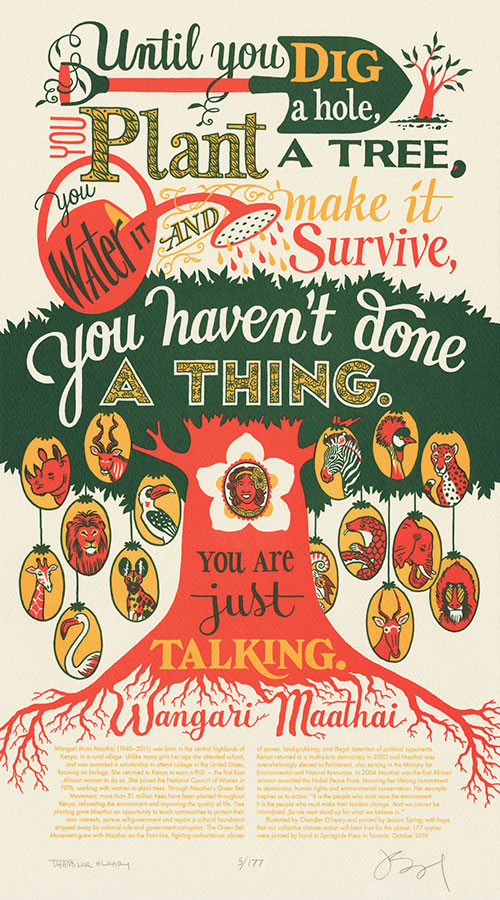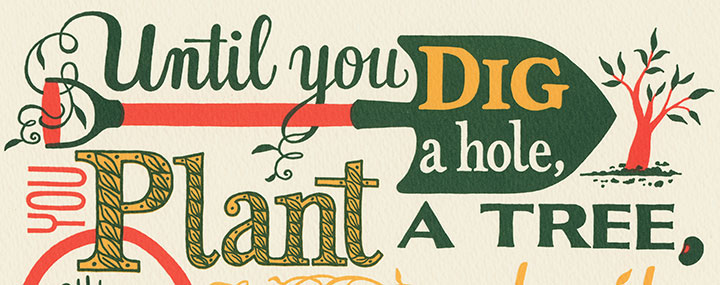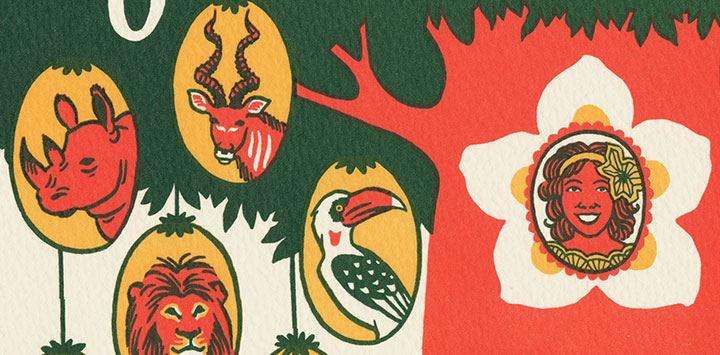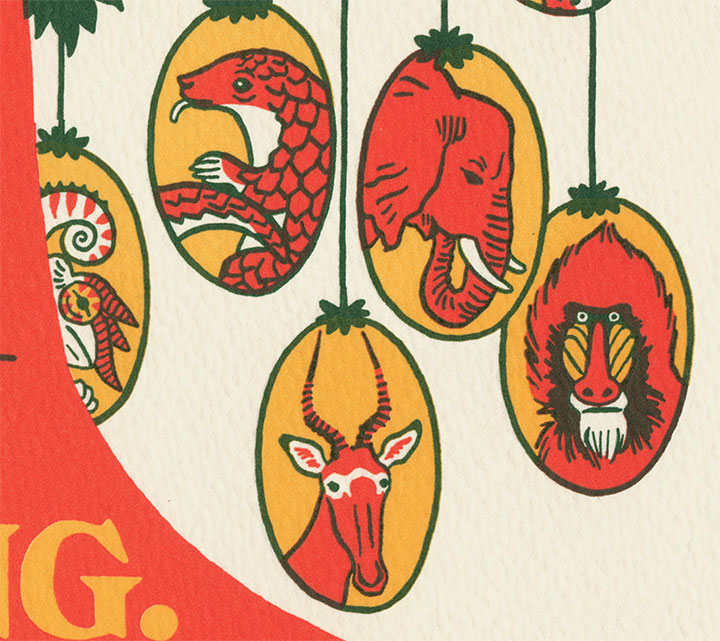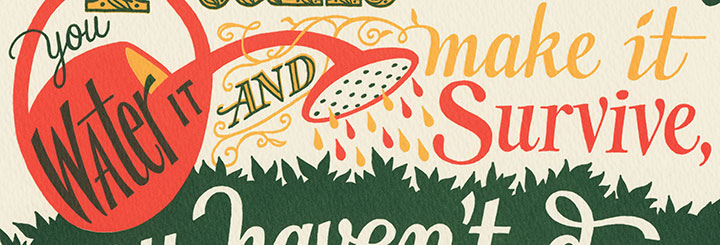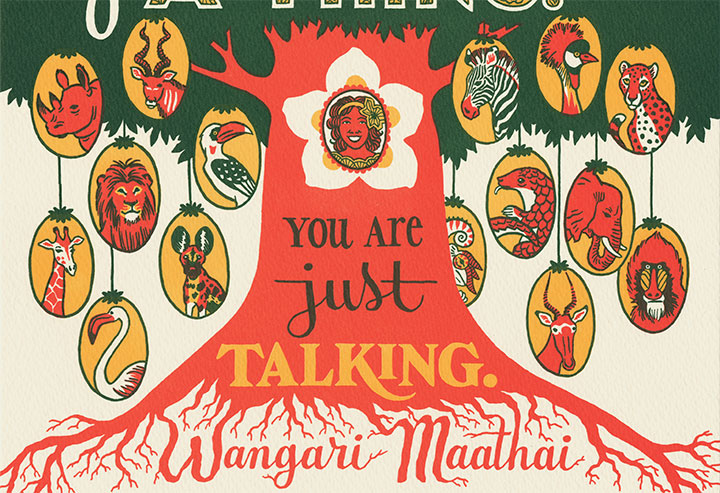This season we are celebrating the efforts of young, live feminists like Greta Thunberg, Autumn Peltier, India Logan-Riley, Isra Hirsi, Winnie Asiti, Xiuhtezcatl Martinez, and many others. These young women are leading people of all ages and nationalities into the streets to demand decisive climate action from our world leaders. In solidarity with their efforts, our newest Dead Feminists broadside highlights the words of Africa’s “Mother of Trees,” Wangari Maathai:
Until you dig a hole, you plant a tree, you water it and make it survive, you haven’t done a thing. You are just talking.
Maathai dedicated her life’s work to restoring the environment in her home country of Kenya. Along with a tireless group of women followers, she planted millions of trees, disrupting and enraging a corrupt, authoritarian regime in the process. While her government was bent on resource extraction, the theft of public lands, and a kleptocratic program of personal enrichment (stop us if any of this sounds familiar), Maathai kept planting seeds—and held her ground.
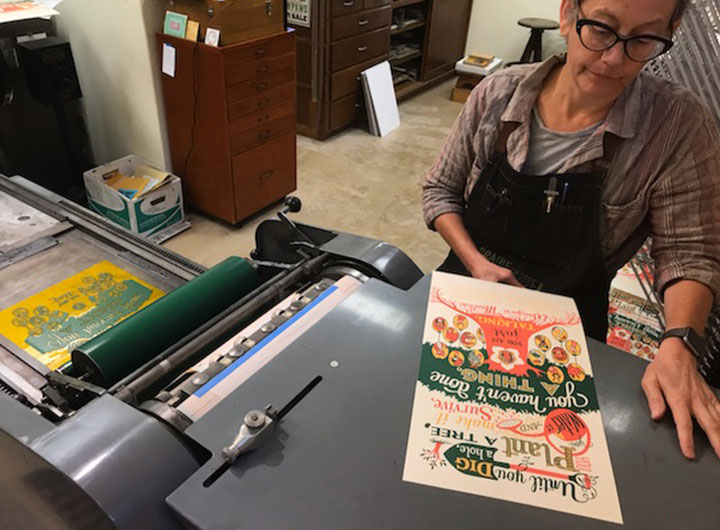
I wanted my illustrations to be really graphic and bold, with strong, simple silhouettes—I ended up thinking a lot about Crockett Johnson’s illustrations in the midcentury children’s classic, The Carrot Seed. While the book wasn’t a direct or obvious reference, there’s definitely a link there (at least in my head!). Printing was the real challenge here, though. Jessica had some seriously tight registration to contend with, as well as the tricky business of printing delicate text and large flood areas in the same print run (without overinking or underinking either one!).
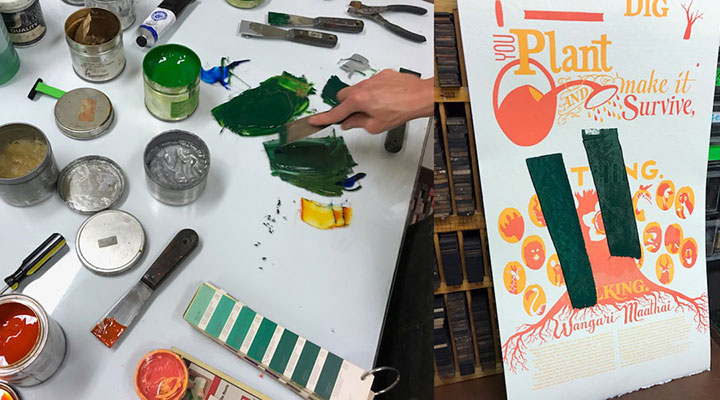
Color ended up being our other big challenge here. We mocked up many different color schemes, never quite happy with any of them. We wanted to avoid too-obvious tree colors like brown or leafy green, but going too far in the other direction just seemed…weird. Then it dawned on us to look at East African textiles for inspiration, and that made us approach the inking station with new eyes. We took those naturalistic tree colors and cranked the saturation up to eleven—and suddenly it all clicked.
Our 29th broadside is printed in the bold, joyful colors of kitenge fabric, which Wangari Maathai wore as her personal signature. Central to the design is an African baobab tree, also known in folklore as the tree of life. The baobab’s iconic stout trunk anchors the composition, with its roots forming Maathai’s name and a white baobab blossom framing her portrait. Elsewhere in the design are a baobab sapling and even a baobab seed (hint: look for a certain comma).
To symbolize the interconnected nature of the world’s biomes and climates, the tree is adorned with “fruit” (drawn to resemble the baobab’s pendulous hanging fruit) portraying a number of vulnerable and endangered Kenyan species, including the African wild dog, Grévy’s zebra, black rhinoceros, hirola (Hunter’s antelope), lesser kudu, and tree pangolin.
To help continue Wangari Maathai’s efforts, we are donating a portion of our proceeds to two tree-planting organizations. First up is Maathai’s own Green Belt Movement, which is continuing her legacy in East Africa. Closer to home, we are also contributing to One Tree Planted, an American nonprofit that plants a tree for every dollar donated (and also follows up over time to make sure the planted trees actually survive). We are supporting both organizations via Action Grants from the Dead Feminists Fund.
Purchase your copy in the shop!
• • • • • • • • • • • • • • • • • • • • • • • • • • • • • • • • • • • • • • • • • • • • • • • • • • • • • • • •
Trees of Life: No. 29 in the Dead Feminists series
Edition size: 176
Poster size: 10 x 18 inches
Printed from hand-drawn lettering and illustrations on an antique Vandercook Universal One press, on archival, 100% rag (cotton) paper. Each piece is numbered and signed by both artists.
Colophon reads:
Wangari Muta Maathai (1940 – 2011) was born in the central highlands of Kenya, in a rural village. Unlike many girls her age she attended school, and was awarded a scholarship to attend college in the United States, focusing on biology. She returned to Kenya to earn a PhD — the first East African woman to do so. She joined the National Council of Women in 1976, working with women to plant trees. Through Maathai’s Green Belt Movement, more than 51 million trees have been planted throughout Kenya, reforesting the environment and improving the quality of life. Tree planting gave Maathai an opportunity to teach communities to protect their own interests, pursue self-government and regain a cultural foundation stripped away by colonial rule and government corruption. The Green Belt Movement grew with Maathai on the front line, fighting authoritarian abuses of power, land-grabbing, and illegal detention of political opponents. Kenya returned to a multi-party democracy in 2002 and Maathai was overwhelmingly elected to Parliament, also serving in the Ministry for Environmental and Natural Resources. In 2004 Maathai was the first African woman awarded the Nobel Peace Prize, honoring her lifelong commitment to democracy, human rights and environmental conservation. Her example inspires us to action: “It is the people who must save the environment. It is the people who must make their leaders change. And we cannot be intimidated. So we must stand up for what we believe in.”
Illustrated by Chandler O’Leary and printed by Jessica Spring, with hope that our collective climate action will bear fruit for the planet. 176 copies were printed by hand at Springtide Press in Tacoma.
